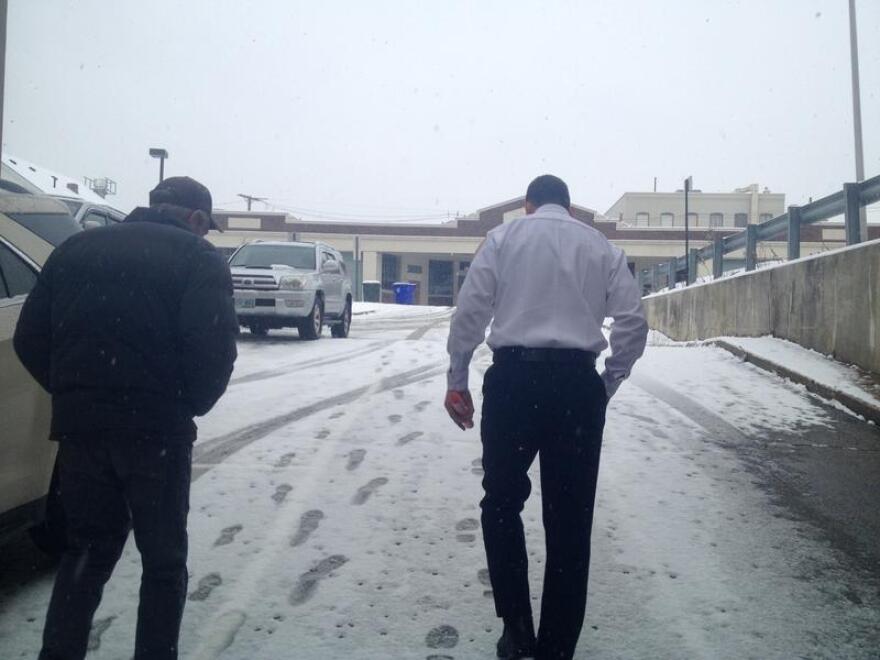A crucial treatment provider in the state’s effort to combat the opioid crisis collapsed, with little warning, last month.
But some say this incident has exposed gaps in the state’s ability to oversee a critical system of care.
In a live televised broadcast at the White House this fall, President Donald Trump declared the opioid crisis a public health emergency. Standing alongside him was Manchester’s Fire Chief.
“Fire Chief Dan Goonan of New Hampshire – great state – runs a program Safe Station, which allows drug dependent residents to seek help at fire stations at any time," Trump told the nation.
Since the program began in 2016, Safe Station has become a model for communities around the state and country looking to get help for people struggling with addiction.

Goonan said firefighters in his department were the ones who first got the idea. Three weeks later, Safe Station was up and running. Goonan said that meant a lot of the details had to be made up on the fly.
“There’s a lot to this – you know it was simple when we came up with the idea but it certainly isn’t simple now," he said.
The biggest question was where to send people once they’d walked through the door. For the past year or so, that had been Serenity Place – a well-established treatment provider in Manchester.
“They really stepped up and jumped in and took over no questions asked – they took over, and I think maybe that was part of the downfall. ‘Ok, we are going to figure this out but we are just going to treat people, we are going to get people through our doors and figure it out later."
During its time with Safe Station, Serenity Place treated roughly 2,000 people. Many of them suffered from more than just substance abuse – many were homeless, or dealing with chronic mental health issues and emotional trauma.
That complicated patient mix, combined with rapid growth, proved too much for Serenity Place to handle.
Last month, the state made the surprising announcement it was taking over the organization. Officials said the nonprofit was deep in debt and close to financial collapse.
"If our federal delegation is successful, if the Governor is successful and millions of dollars flow into New Hampshire to combat the opioid epidemic - I would wager a guess that the Bureau of Drug and Alcohol Services probably would not have the capacity to manage those dollars unless there was more staff to do it," Rourke said.
Another local non-profit has since taken over day-to-day operations.
But a key question remains: why didn’t the state notice one of its key providers was falling apart?
New Hampshire relies on nonprofits, like Serenity Place, to be the front line in the opioid crisis. They’re often funded in large part by state contracts, using tax dollars to provide public services. Andru Volinsky sits on the Executive Council, which approves many of these contracts. He said this case makes it clear - the state lacks the infrastructure to handle what they’ve taken on.
“For many years we have tried to not pay the piper on this and those shortcomings, those underfundings, those efforts to downshift responsibilities and some instances, have come back to haunt us," Volinsky said.
And in the long run, Volinsky said, these shortcomings will cost New Hampshire more. The state has so far invested $180,000 to keep services afloat at Serenity Place. That amount will likely rise.
The state contracts with 38 providers to offer substance abuse services, spending more than $20 million a year. But only a handful of staff in the Department of Health and Human Services are charged with managing, supporting, and overseeing that these organizations are providing the services needed.

Tym Rourke works for the New Hampshire Charitable Foundation and is the former chair of the Governor’s Commission on Drugs and Alcohol. He said without proper staffing, these providers aren’t getting the support they need to succeed.
“If our federal delegation is successful, if the governor is successful and millions of dollars flow into New Hampshire to combat the opioid epidemic, I would wager a guess that the Bureau of Drug and Alcohol Services probably would not have the capacity to manage those dollars unless there was more staff to do it.”
Health Commissioner Jeff Meyers says he’d welcome more staff and is talking to lawmakers about securing that funding. In the meantime, the department is conducting financial audits of all the substance abuse providers in the state.







